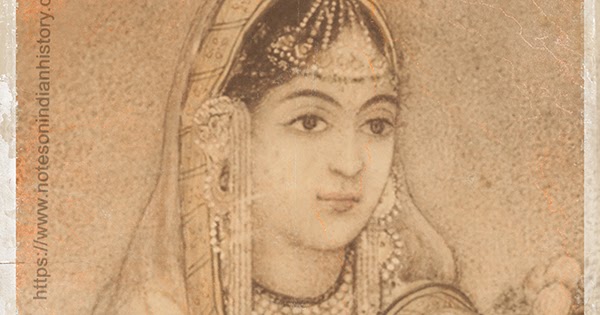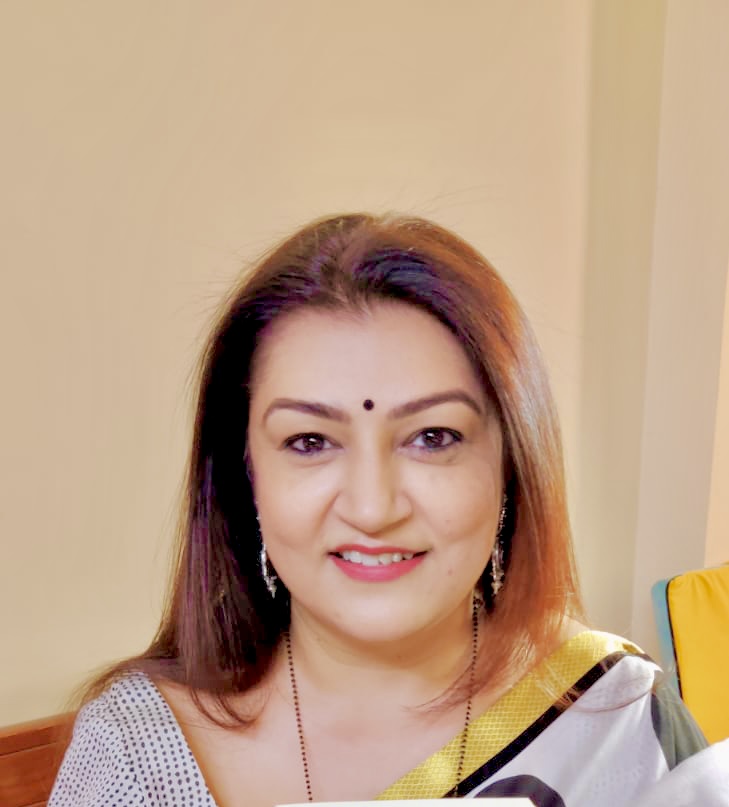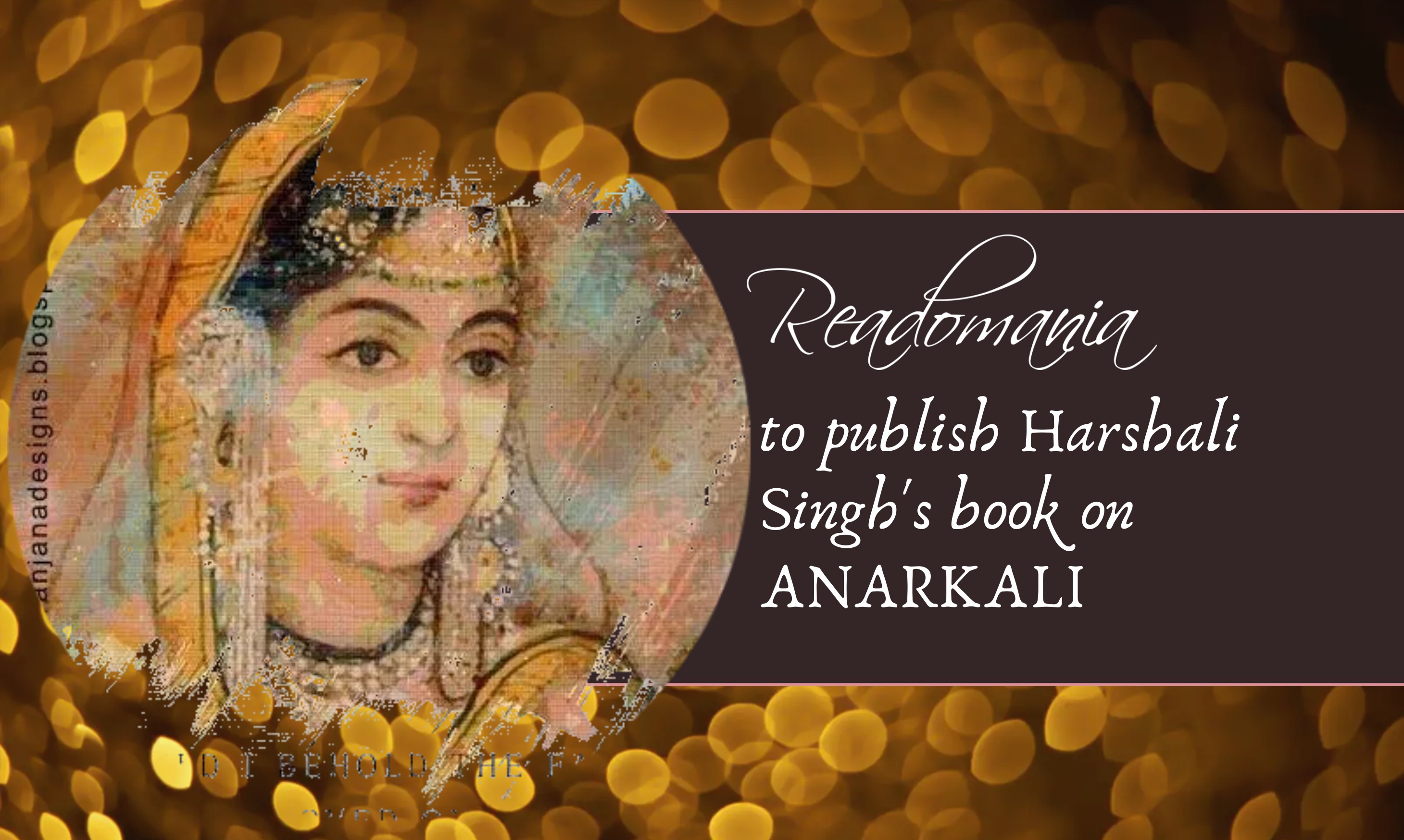Readomania announces Harshali Singh's book on Anarkali.
Singh says, 'A room that shimmers with millions of shiny mirrors. A young girl, nay a woman serving the wrinkled Mughal King. His eyes watched her hypnotic movements out of ecstatic glazed eyes split open enough to feast upon the perfection of his paramour's pristine figure. A movement spied in the mirrors that allow no secrets. A pause, the hint of a smile, and a sigh that escapes unbeknown to the dutiful woman initiate an avalanche of tyranny on a hapless love.
The picture described above is what my mind conjures whenever I hear the word, Anarkali. The romantic in me is content with the tragic story of the lovelorn couple. But as a woman who has struggled to take back her agency from the tight clutches of this patriarchal society, I am convinced that Anarkali could not merely have been a one-dimensional woman, swayed by a charming prince who was also a stepson. I refuse to accept that a girl who entered the harem in her teens, rose quickly within the hierarchical zenana to become Akbar-e-Azam's beloved consort, gave birth to a prince and had the audacity to fall in love with an unattainable man, was this minimalistic and naïve.
So, who was Anarkali?

A meek damsel overwhelmed by the love and attention of a strapping young man… or an aware woman intelligent enough to secure the power centre of the future?
Anarkali intrigued me. Not the love story between her and Salim or her defiance of Akbar's diktat. But Anarkali, the woman who made the choices that led her to be immured into a Lahore Fort wall.
Nothing substantial is available about Anarkali's life or her family, roots, ancestry or life in Akbar's Harem. Surprisingly she doesn't find space even in the Akbarnama or Tuzuk-e-Jahangiri, the memoirs of Akbar and Salim, the two men who claimed to love her. She was first mentioned by an English tourist and trader as a byline long after her death.
Despite the numerous interpretations and labels, Anarkali remains shrouded in mystery, fading slowly from the collective memories. Anarkali is known for her beauty and tragic love, forever made immortal by the face of the mesmerising Madhubala pining for her Salim even as the last brick is secured. However, this surely, cannot be her only claim to fame.
We, as women, are more than who we choose to love.
What did the young girl who gave birth to Akbar's son, Prince Daniyal, want for herself? What choices did she make to secure her position in the royal court? Did Akbar retract his order to bury her in a wall or find a way for her to escape? The questions are endless.
To satisfy this urge to learn more about Sharf-un- Nisa later christened Anarkali by a besotted Akbar, I went on a quest to locate her whereabouts in dusty libraries and the maze-like annals of the virtual world.
A fragmented picture emerged of a famed, ethereal, lonely courtesan and a lost Prince. This forbidden relationship was first brought forth as a play and then a slew of movies and books, all celebrating the love that defined the two protagonists. The story of Anarkali and Salim is undoubtedly an illustration of the oppressed taking back control from the powerful.
But where was Anarkali, the woman, in all this?
They say art mimics life. Hence, I wanted to join the dots and tell Anarkali's story as I envision a woman like her would have been.
The story of Anarkali, the woman, narrated from her perspective and voice, shall offer a fascinating look into the dynamics of power, love and relationships. It is an unveiling but is fundamental and real for this very reason.
 Dr. Harshali Singh is a Member Judge at the District Consumer Dispute Redressal Commission, an Author, a Poet, an academician, an Occupational Therapist and a Painter.
Dr. Harshali Singh is a Member Judge at the District Consumer Dispute Redressal Commission, an Author, a Poet, an academician, an Occupational Therapist and a Painter.
She has won the ‘Write India’ Season 2, an initiative of The Times of India Group. She was also conferred the Iconic Author Award 2022 by Aesthetics International Lifestyle magazine. Her book ‘Paradox of Dreams’ was longlisted for the Oxford Book Cover Prize 2023.
She is the founding member of a literary initiative called House of Harmony and now also wears the hat of a Literature Festival Curator. In tandem with the vision of creating a platform for seasoned and debut authors, the first foray of House of Harmony was concluded successfully at Kunzum Books in April 2023.
Dr. Harshali Singh has written in several literary genres, from poetry, fiction, and columns to essays. She is the contributing author in several anthologies and regularly writes for e-magazines. She has written several books on women-centric issues like domestic violence, alienation, female foeticide, marital rape and women empowerment and independence.
She takes a keen interest in helping people with special needs and follows her passion for helping children, finding it most fulfilling and personally uplifting. Her novels, ‘A Window to her Dreams’, ‘The Anatomy of Choice’ and ‘A Paradox of Dreams’, form part of an eight-book series called the ‘Haveli Series’ published by Readomania. She has written several short stories in Anthologies that traverse varied genres from Historical Fiction, mythology, horror, erotica and many more with reputed publishing houses.
Her poems form part of several Poetry Anthologies like ‘She- The Shakti’ and ‘Remnants of Loss’. She has been on the organising committee of Kavya Kumbh, an International Trilingual Poetry Fest where her poems feature in the anthologies ‘Confluence’, ‘Shakti’, and ‘Purush’. ‘Monochrome Verses’, a coffee table book, ‘Spring Love Poems’ carry her poems from the house of Chrysanthemum Chronicles She has also chaired discussions and has been part of various panels with eminent personalities in their chosen fields of World Peace, meditation, infertility, and social causes and stalwarts in writing. As a painter, she expresses herself and her observations of her surroundings in oil paintings, exhibited in solo and group shows in India Habitat Center, New Delhi, and Gurugram.


Comments